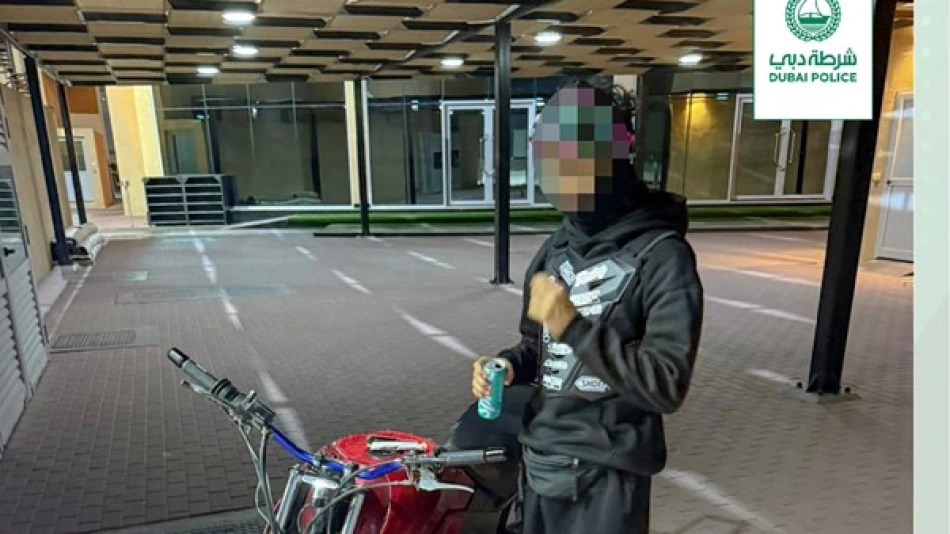
Dubai Police Apprehend Youth Causing Chaos on Motorcycle in Khawanej Neighborhood
Dubai Police Crack Down on Reckless Motorcycle Stunts as Road Safety Campaign Intensifies
Dubai Police have arrested a young motorcyclist performing dangerous wheelies on public walkways without license plates, highlighting the emirate's zero-tolerance approach to reckless driving behaviors that endanger public safety. The incident underscores growing concerns about youth motorcycle culture and parental responsibility in one of the world's most heavily monitored traffic environments.
High-Stakes Pursuit in Al Khawaneej
Traffic patrols in Dubai's Al Khawaneej district spotted the unlicensed rider performing stunts on a single wheel along the Quranic Park walkway last Sunday evening. Colonel Jumaa Salem bin Suwaidan, Director General of Traffic at Dubai Police, revealed that officers carefully tracked the motorcyclist for nearly an hour before apprehending him at a parking complex.
The seized motorcycle was already flagged by traffic authorities due to accumulated violations and expired licensing, indicating a pattern of non-compliance that extends beyond this single incident. The rider has been transferred to specialized units for legal investigation, with formal charges expected to follow.
Legal Framework Gets Tougher
Dubai's traffic enforcement reflects the UAE's broader strategy to maintain its reputation as a safe, well-regulated society. The legal consequences for reckless driving are severe, with authorities empowered to impound vehicles, impose heavy fines, and refer cases directly to the judiciary when public safety is compromised.
This approach mirrors successful traffic safety models in Singapore and other highly regulated urban environments, where strict enforcement has proven effective in reducing road fatalities and maintaining order in dense metropolitan areas.
Parental Liability Under Scrutiny
Perhaps most significantly, Colonel bin Suwaidan emphasized that parental ignorance is not a legal defense. Parents and guardians bear direct responsibility for monitoring their children's activities, particularly regarding unlicensed vehicle operation. This legal framework places Dubai ahead of many jurisdictions in holding families accountable for youth traffic violations.
Community Surveillance Network Expands
Dubai Police are leveraging technology and community participation through their "Police Eye" service within the smart police app and the "We Are All Police" hotline (901). This crowdsourced enforcement model represents a sophisticated approach to traffic monitoring that goes beyond traditional patrol methods.
The strategy reflects Dubai's broader smart city initiatives, where citizen reporting complements extensive CCTV networks and automated enforcement systems. This multi-layered approach has helped Dubai maintain relatively low traffic fatality rates despite rapid population growth and increasing vehicle density.
Implications for Youth Culture and Urban Planning
The incident highlights tensions between Dubai's carefully managed urban environment and emerging youth subcultures seeking outlets for risk-taking behavior. Unlike cities with designated areas for motorcycle enthusiasts, Dubai's compact urban design and strict regulations leave little space for such activities.
This enforcement action suggests Dubai authorities are prioritizing public safety over recreational freedoms, a choice that aligns with the emirate's broader governance philosophy but may require alternative solutions for youth engagement and recreational motorcycle use.
The case also demonstrates how modern traffic enforcement increasingly relies on sustained surveillance and community reporting rather than random stops, indicating a shift toward predictive and preventive policing models that other cities may adopt as urban density increases globally.
Most Viewed News

 Layla Al Mansoori
Layla Al Mansoori






